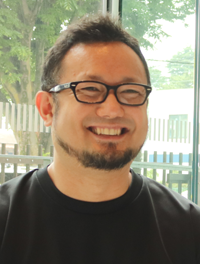Molecular Oncology for Companion Animals
|
|
|
|
|
|
Kazuhiko OCHIAI, DVM, PhD
|
| (Supervise Master Students) |
| Position |
: |
Associate Professor |
| KAKEN Researcher Number |
: |
30550488 |
| ORCID ID |
: |
0000-0002-5736-0598 |
| Main Research Theme
|
|
Research on Cancer-Related Genes in Companion Animals |
| Research Keywords |
|
Genes, Proteins, Cancer, Cell Biology, Molecular Biology |
| Lab. Location |
: |
Departmnt of Functional Animal Anatomy
3th Floor, Building D |
| E-mail |
: |
kochiai(@mark)nvlu.ac.jp |
Research
ヒトは様々な動物を家畜化し、長年にわたって品種改良を進めてきました。その中でイヌは約1万年前に家畜化されて以降、驚異的な速さで他に類を見ない品種多様性を獲得しました。私は「イヌで乳腺腫瘍発症が非常に多いこと」、「イヌは品種多様性が大きいこと」に関連性を見出し、イヌを乳腺腫瘍発症機構解明および、種の進化速度決定因子のランドマークに出来るのではないかと考え研究を進めています。ヒトで遺伝性乳がん原因遺伝子であるBRCA2という遺伝子は、その変異が乳腺腫瘍発症に繋がります。BRCA2はDNAの2本鎖切断時にRAD51等の相互作用分子と協働し、相同組換え修復を行ってゲノムの安定性を維持しています。相同組換え修復は、配偶子形成時の父母由来染色体シャッフルにも密接に関与しています。乳腺腫瘍が多く、品種多様性に富むイヌはこの機構に特徴があるのではあるのでは?と予測し、関連分子群の相互作用様式の解析と相同組換え効率の数値化と比較を中心に研究を行っています(研究内容イメージ図参照)。

また、伴侶動物の多様ながん関連遺伝子の変異検索と機能解析も行っており、新規の早期遺伝子診断法や治療戦略の開発も行っています。
Guidance Policy for Graduate Students
これまでに、3名の獣医保健看護学専攻博士前期課程の大学院生指導経験があります。指導方針としては、学生の状況に合わせて最適な指導を学生と対話しながら進めることを心がけてきました。学部を卒業して就職した学生は、同じ時期に収入を得ながら社会で様々なスキルを身に着けます。一方、大学院生は、学納金を支払いながら学業を続けます。そのため、在学中により多くのスキルを身に着け、将来への可能性を拡げる指導を行うことが、大学院指導教員の責任だと思っています。
研究者のタマゴである大学院生が、日々自分の成長を感じ、社会で活躍する同級生に負い目を持たないで研究を続けられるよう、目に見える成果の獲得を目指した研究指導を行っていきます。論文や学会発表などの研究業績は将来への可能性の具現化であるとともに、様々な金銭的サポートに繋がるチャンスの種でもあります。その価値を学生と共有し、戦略的な大学院生活を目指します。
Publications
| 1. |
Kawakami S, Ochiai K. et al. (2020).
(First author: Graduate students)
Novel canine isocitrate dehydrogenase 1 mutation Y208C attenuates dimerization ability.
Oncol Lett., 20(6):351.
DOI: 10.3892/ol.2020.12214
*Discovered a novel mutation in the causative gene of glioma in dogs and analyzed the associated functional changes. |
| 2. |
Uemura M, Ochiai K, et al.. (2020).
(First author: Graduate students)
The canine RAD51 mutation leads to the attenuation of interaction with PALB2.
Vet Comp Oncol, 18(2):247-255.
DOI: 10.1111/vco.12542
*Analyzed the molecular functional changes caused by a mutation in the canine RAD51 gene.
|
| 3. |
Kawakami S, Ochiai K. et al.. (2018).
(First author: Graduate students)
R132 mutations in canine isocitrate dehydrogenase 1 (IDH1) lead to functional changes.
Vet Res Commun, 42(1):49-56.
DOI: 10.1007/s11259-017-9707-8
*Analyzed the mutation and functional changes of the IDH1 gene responsible for glioma in dogs.
|
| 4. |
Kawakami S, Ochiai K. et al.. (2018).
(First author: Graduate students)
Functional alteration of canine isocitrate dehydrogenase 2 (IDH2) via an R174K mutation.
J Vet Med Sci, 80(1):85-91.
DOI: 10.1292/jvms.17-0362.
*Analyzed the mutation and functional changes of the IDH2 gene responsible for glioma in dogs.
|
| 5. |
Kato Y, Ochiai K. et al., (2017).
(First author: Graduate students)
Canine REIC/Dkk-3 interacts with SGTA and restores androgen receptor signalling in androgen-independent prostate cancer cell lines.
BMC Vet Res, 13(1):170.
DOI: 10.1186/s12917-017-1094-4.
*Analyzed the function of the SGTA gene involved in the mechanism of refractory prostate cancer in dogs.
|
| 6. |
Kato Y, Ochiai K. et al.. (2015).
(First author: Graduate students)
Molecular cloning of canine co-chaperone small glutamine-rich tetratricopeptide repeat-containing protein α (SGTA) and investigation of its ability to suppress androgen receptor signalling in androgen-independent prostate cancer.
Vet J, 206(2):143-8.
DOI: 10.1016/j.tvjl.2015.08.002.
*Analyzed the structure and function of the SGTA factor involved in the progression of prostate cancer in dogs.
|
Detailed Information (Researchmap)


